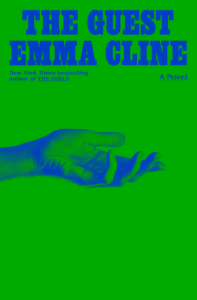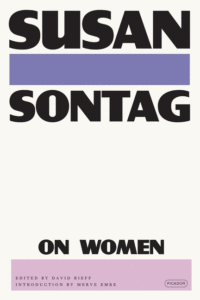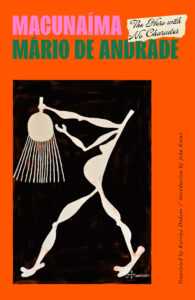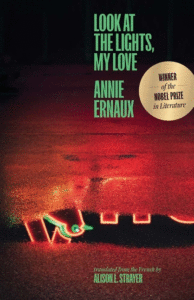
5 Book Reviews You Need to Read This Week
“When I put down the book, I felt I was waking after a vivid, portentous dream.”
Our basket of brilliant reviews this week includes Sarah Chihaya on Emma Cline’s The Guest, Becca Rothfeld on Susan Sontag’s On Women, Abraham Verghese on Siddhartha Deb’s The Light at the End of the World, Meg Weeks on Mário de Andrade’s Macunaíma, and J. Howard Rosier on Annie Ernaux’s Look at the Lights, My Love.
Brought to you by Book Marks, Lit Hub’s “Rotten Tomatoes for books.”
*
“In another novel, Alex could easily fit into the heroine or anti-heroine category. Her situation is desperate, her self-deception profound, and her moral compass unpredictable: a good setup for sympathy, fascination, or both. Cline, however, is assiduously uninterested in molding Alex into one thing or another. This mutability is partly Alex’s job; she prides herself on her ability to case a client’s needs and smoothly be shaped by them … The Guest, like its non-heroine, is something of a shape-shifter.
The book restlessly flits between familiar forms; during Alex’s sojourn, it seems equally plausible that nothing will happen and that a whole lot of violent something will. Will the novel turn out to be a take on the white-woman-in-peril thriller? A cool, provocative sketch of an unlikable protagonist? Leaning into its Long Island locale, perhaps a Gatsbyesque romantic drama? There are stagy whispers of all of the above, but The Guest actually engages more closely with two other types of narrative. The first is the contemporary class satire: the post-Parasite turn, especially in film and television, toward punishing sendups of the one percent. Cline’s novel falls into a genre that could more precisely be called ‘the vacay bummer,’ in which ludicrously rich people are reproved for their life styles while on ludicrously decadent vacations …
Yet Cline’s novel is also aware that the fantasy of eat-the-rich stories is just that: a fantasy. In a show like The White Lotus, this point is made through cutting, extravagant farce, but here it comes on like a bruise: slow, dull, and inevitable. Alex’s ambitions are limited to survival, and she has neither the cunning nor the bandwidth to blow up the system, or even to get a score from her marks. She doesn’t want to destroy the rich; in fact, she constantly tries not to ruffle their uniformly groomed feathers. She merely passes the time, day by day, pill by mind-dulling pill…Alex is more of a bumpy protrusion than a sharp edge, and her passivity, her lack of drive or guile, grinds down the edge of the genre itself. The Guest is not a caustic takedown of the rich, but a queasily unfunny reminder of their invulnerability … In the end, Cline relies on a perverse desire of the reader’s own, to see if a novel that promises so much can sustain itself on the negative space of character and event, on refusing straightforward satisfaction.”
–Sarah Chihaya on Emma Cline’s The Guest (The New Yorker)
“The great French writer Colette once speculated that ‘certain highly complex human beings’ are marked by their ‘mental hermaphroditism.’ The fabled essayist Susan Sontag was among them. She was a woman, but she dressed in the glamorously genderless garb of an intellectual celebrity and wrote on the weighty topics usually reserved for her male peers. In her journals, she mused that ‘to be an intellectual is to be attached to the inherent value of plurality.’
At her best, Sontag refused to truncate herself in the interest of legibility or to simplify her thinking in the service of easy answers. At her worst, she was dodgy and noncommittal … Sontag is best known as a meticulous critic of high culture, but there is a reason I was so desperate for a copy of her bracing meditation on the ‘humiliating process of gradual sexual disqualification’ that women undergo as they age. Her writing on modernist novels and foreign-language film is erudite, challenging and occasionally ponderous; her writing on women is crisp and cutting. Heretically, I prefer the latter …
It is a delight to watch such an agile mind slicing through the flab of lazy thinking. To those who claim that women have different natures than men, Sontag replies succinctly: ‘The argument from “nature” is self-confirming. Individual lives which do not confirm the argument will always be taken as exceptions, thereby leaving the stereotypes intact’…The aim of feminism must be to ‘abolish the mystique of “nature,”‘ she wrote, to ‘work toward an end to all stereotyping of any kind.’ The wholesale abolition of gender is our only hope of escaping its cruelties and curtailments. Whether Sontag’s defiant uncategorizability strikes you as subtlety or evasiveness depends on your stomach for uncertainty. ‘No position can be a comfortable one or should be complacently held,’ she said…
The most important debates of the era must remain knotty, ‘unresolved.’ For my part, I prefer conclusiveness in argument—but in life, I am greatly moved by the image of a world in which everyone has the chance to embody the ‘mental hermaphroditism’ that allowed Colette and Sontag to be so intricate, so multiple, so ample and so whole.”
–Becca Rothfeld on Susan Sontag’s On Women (The Washington Post)
“When I put down the book, I felt I was waking after a vivid, portentous dream, but one whose edges were now rapidly crumbling. That feeling should have been dissatisfying but wasn’t; instead, I was in awe of Deb’s imagination and razor-sharp prose. The hallucinatory quality of his narrative reminded me of William Burroughs’s Naked Lunch, while its apocalyptic trajectory had echoes of Cormac McCarthy’s Blood Meridian… In researching his acclaimed 2011 nonfiction book The Beautiful and the Damned: A Portrait of the New India, Deb crisscrossed the subcontinent.
On every page of his new novel, one senses the authority of a writer who has pounded urban concrete and rural cow paths, witnessed shocking political machinations, touched the seedy underbelly of industry and experienced the extremes of the teeming, unruly nation that is India. That the novel invokes a glorious past, hints at a utopian future and contradicts reality could be the author’s way to protest an authoritarian government skilled in just that. Deb seems to set his sights on other issues, too: When artificial intelligence can make our speech, text, appearance and existence better than it really is, then who are we? Meanwhile, the planet we have poisoned turns on us. Whatever the author’s intent, I felt privileged to have been on an odyssey quite unlike any other.”
–Abraham Verghese on Siddhartha Deb’s The Light at the End of the World (The New York Times Book Review)
“‘Ah! Just so lazy!’ goes the catchphrase of Macunaíma, the protagonist of Mário de Andrade’s eponymous 1928 novel. This major work of Brazilian modernist fiction, first published in English in 1984, has gained a new life in Katrina Dodson’s recent translation. In this sprawling, absurdist novel, the title character’s quest to recover a cherished amulet takes him on an odyssey from the Amazon rainforest to the bustling city of São Paulo and back again, during which Macunaíma encounters all manner of figures from Brazilian history, popular folklore, indigenous mythology, and Andrade’s own imagination. Is the hero’s frequent expression of lethargy an indictment of a uniquely Brazilian indolence, a stubborn backwardness impeding the modernization that the political elites of Andrade’s time so desperately desired? Or does it suggest a sly wisdom regarding the futility of exerting oneself when sensual pleasures are closer at hand than the spoils of hard work? …
Yet he did not set out in what is widely regarded as his magnum opus to condemn Brazil as unequivocally juvenile or primitive. Rather, he offers Macunaíma as an ambivalent appraisal of a country in a moment of cultural and political transition … Over the course of seventeen chapters and an epilogue, violent parables and raunchy parodies nestle within one another to create a dazzling and chaotic Luso-tropical Holy Grail epic … In juxtaposing São Paulo’s glittering skyscrapers and sleek automobiles with the thatched huts and manioc groves of Amazonia, Macunaíma reveals its author’s anxieties about modernization and Brazil’s position vis-à-vis Europe, a continent that represented both the past, in terms of the region’s colonial heritage, and the future, in terms of advancement in governance, public health, and high culture …
Despite its publication nearly a century ago, Andrade’s commentary on the pliability of Brazilianness is no less relevant today. Many of the culture-war issues that came to the fore in the country’s most recent presidential election are, in a sense, contentious debates over the very nature of contemporary Brazil and the people that reside within it. Is it a nation with a robust landowning class buttressed by an iron-fisted law enforcement apparatus and a Christian worldview of traditional family life? Or is it a multiethnic, multi-faith society, one that has given rise to many insurgent movements for racial, gender, and economic justice, yet still grappling with the specters of colonial and authoritarian violence?”
–Meg Weeks on Mário de Andrade’s Macunaíma (The Baffler)
“Annie Ernaux, the 2022 Nobel laureate in literature, takes the big-box store as her subject. She trains a careful eye on her local Auchan—a combined supermarket and department store—in Cergy, France, a middle-class suburb about 20 miles outside Paris. From November 2012 to October 2013, she recorded each of her visits to the store in a diary. The finished product, Look at the Lights, My Love, published in France in 2014, is an indictment of modern consumerism and the way it robs the individual of their autonomy.
Through observation and analysis that feel nearly anthropological in their detail, Ernaux argues that our shopping habits are determined not by personal choices, but by factors that are frequently outside our control—our financial situation, our location, what products we have access to. Supermarkets were supposed to be great equalizers, democratizing food access, but they have instead become a microcosm of contemporary consumer malaise. Ernaux’s departure from the intensely intimate relationships that are the focus of much of her previous work might feel unorthodox at first.
But as her gloomy portrait of the big-box store begins to form, it becomes clear that this book isn’t so different from her others: Her interest lies less in the store itself than in the way it serves as a site for interpersonal interactions … Ernaux is greatly concerned with ‘the humiliation inflicted by commercial goods: they are too expensive, so I’m worth nothing.’ But what makes Look at the Lights a work of art, rather than a manifesto, is the sheer sensuousness of Ernaux’s language. This is not to be confused with sensuality—which the author is renowned for—but is rather the subtle visual, auditory, and tactile details that fill the pages and lend firsthand credibility to the argument this slim work makes.”
–J. Howard Rosier on Annie Ernaux’s Look at the Lights, My Love (The Atlantic)
Book Marks
Visit Book Marks, Lit Hub's home for book reviews, at https://bookmarks.reviews/ or on social media at @bookmarksreads.

























